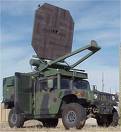On Oct. 19, NATO troops on patrol in Afghanistan's Helmand province fired a warning shot to stop a civilian vehicle that had come too close to the soldiers' convoy. The round ricocheted, killing a two-year-old girl outside her home, according to Agence France-Presse. It's an old problem in Iraq and Afghanistan, where occupying troops find themselves targeted by suicide bombers in chaotic urban environments where it's impossible to tell the good guys from the bad. Most soldiers have no peaceful way of communicating with civilian drivers other than with vague hand gestures -- and few means short of a rifle to stop potential attackers. For that reason, the U.S. military for years has been working to get so-called "nonlethal" weapons into the hands of deployed troops. The potential of such weapons to help U.S. troops fight the kind of insurgency warfare that they face in Iraq and Afghanistan has been recognized almost since the insurgency in Iraq began.
U.S. Military Fumbles Requests for Nonlethal Weapons in Iraq, Afghanistan

